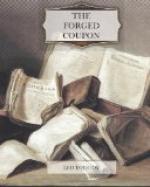“There is nothing wrong in not living up to the ideal which you have made for yourself, but what is wrong is, if on looking back, you cannot see that you have made the least step nearer to your ideal.”
How far Tolstoy’s doctrines may influence succeeding generations it is impossible to foretell; but when time has extinguished what is merely personal or racial, the divine spark which he received from his great spiritual forerunners in other times and countries will undoubtedly be found alight. His universality enabled him to unite himself closely with them in mental sympathy; sometimes so closely, as in the case of J. J. Rousseau, as to raise analogies and comparisons designed to show that he merely followed in a well-worn pathway. Yet the similarity of Tolstoy’s ideas to those of the author of the “Contrat Social” hardly goes beyond a mutual distrust of Art and Science as aids to human happiness and virtue, and a desire to establish among mankind a true sense of brotherhood. For the rest, the appeals which they individually made to Humanity were as dissimilar as the currents of their lives, and equally dissimilar in effect.
The magic flute of Rousseau’s eloquence breathed fanaticism into his disciples, and a desire to mass themselves against the foes of liberty. Tolstoy’s trumpet-call sounds a deeper note. It pierces the heart, summoning each man to the inquisition of his own conscience, and to justify his existence by labour, that he may thereafter sleep the sleep of peace.
The exaltation which he awakens owes nothing to rhythmical language nor to subtle interpretations of sensuous emotion; it proceeds from a perception of eternal truth, the truth that has love, faith, courage, and self-sacrifice for the cornerstones of its enduring edifice.
Note—Owing
to circumstances entirely outside the control of
the editor some of these
translations have been done in
haste and there has
not been sufficient time for revision.
The translators were
chosen by an agent of the executor and
not by the editor.
LIST OF POSTHUMOUS WORKS, GIVING DATE WHEN EACH WAS FINISHED OR LENGTH OF TIME OCCUPIED IN WRITING.
Father Serge. 1890-98.
Introduction to the
History of a Mother. 1894.
Memoirs of a Mother.
1894.
The Young Czar. 1894.
Diary of a Lunatic.
1896.
Hadji Murat. 1896-1904.
The Light that shines
in Darkness. 1898-1901.
The Man who was dead.
1900.
After the Ball. 1903.
The Forged Coupon. 1904.
Alexis. 1905.
Diary of Alexander I.
1905.
The Dream. 1906.
Father Vassily. 1906.
There are no Guilty
People. 1909.
The Wisdom of Children.
1909.
The Cause of it All.
1910.
Chodynko. 1910.
Two Travellers.
Date uncertain.




